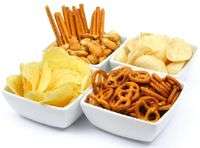July 1, 2011 report
American snacking habits to blame for obesity: study

(Medical Xpress) -- In a new study published in PLoS Medicine, researchers have shown that it is not only the American habit of “super-sizing” meals that is leading to obesity, but the number of snacks and meals that are being eaten throughout the day.
The study, led by professor of nutrition Barry Popkin from the University of North Carolina, looked at data from food studies conducted as far back as the 1970s and discovered that Americans have increased their daily caloric intake. In 1977-78, Americans were consuming on average 1,803 kcal and in 2003-06 that number had jumped up to 2,374.
The study examined the amount of calories in a specific amount of food, portion sizes that were consumed and how many snacks and meals were consumed within a day. Looking at the results, the researchers concluded that portion size and the amount of meals and snacks eaten are the biggest factors responsible for the change.
According to the numbers, the number of daily meals and snacks in 1977 were 3.8 but rose to 4.8 in 2006. However, the top 10 percent of surveys showed that the number of meals and snacks were as high as seven per day. It appears that in the last few years, portion size seems to be stabilizing, however the total number of calories consumed is increasing. A main reason behind this is the daily consumption of more than 220 more calories consumed daily from soft drinks than in years past.
While many diet and health advice over the years has suggested eating more frequent small meals, it appears the idea of eating more frequently was understood but the foods chosen are not correct. Eating small, frequent meals can boost your metabolism and control hunger more than eating three big meals a day, however, if these smaller meals are high-calorie and salty options, the benefits are not seen.
According to the Centers for Disease Control, as many as 25 percent of Americans are obese and these findings suggest that a new focus needs to be placed on portion size and snacking habits in order to reduce those numbers.
More information: Duffey KJ, Popkin BM (2011) Energy Density, Portion Size, and Eating Occasions: Contributions to Increased Energy Intake in the United States, 1977–2006. PLoS Med 8(6): e1001050. doi:10.1371/journal.pmed.1001050
Abstract
Competing theories attempt to explain changes in total energy (TE) intake; however, a rigorous, comprehensive examination of these explanations has not been undertaken. Our objective was to examine the relative contribution of energy density (ED), portion size (PS), and the number of eating/drinking occasions (EOs) to changes in daily TE. Using cross-sectional nationally representative data from the Nationwide Food Consumption Survey (1977–78), Continuing Survey of Food Intakes of Individuals (1989–91), and National Health and Nutrition Examination Surveys (1994–98 and 2003–06) for adults (aged ≥19 y), we mathematically decompose TE (kcal/d) to understand the relative contributions of each component—PS (grams/EO), ED (kcal/g/EO) and EO(number)—to changes in TE over time. There was an increase in TE intake (+570 kcal/d) and the number of daily EOs (+1.1) between 1977–78 and 2003–06. The average PS increased between 1977–78 and 1994–98, then dropped slightly between 1994–98 and 2003–06, while the average ED remained steady between 1977–78 and 1989–91, then declined slightly between 1989–91 and 1994–98. Estimates from the decomposition statistical models suggest that between 1977–78 and 1989–91, annualized changes in PS contributed nearly 15 kcal/d/y to increases in TE, while changes in EO accounted for just 4 kcal/d/y. Between 1994–98 and 2003–06 changes in EO accounted for 39 kcal/d/y of increase and changes in PS accounted for 1 kcal/d/y of decline in the annualized change in TE. While all three components have contributed to some extent to 30-y changes in TE, changes in EO and PS have accounted for most of the change. These findings suggest a new focus for efforts to reduce energy imbalances in US adults.
© 2010 PhysOrg.com















